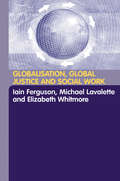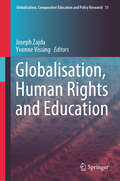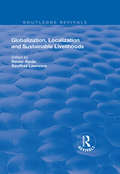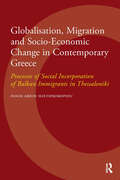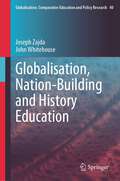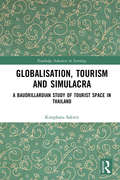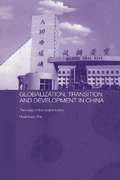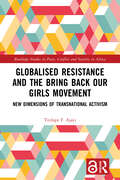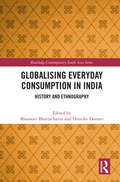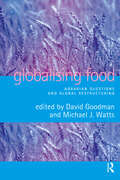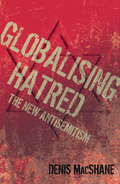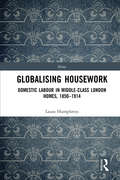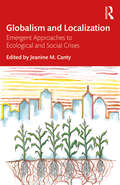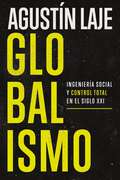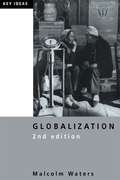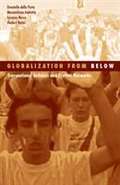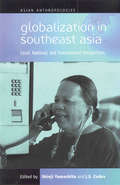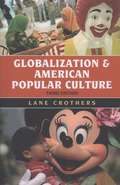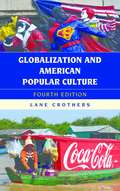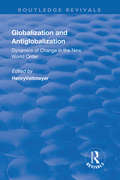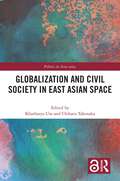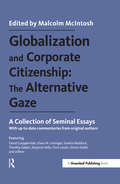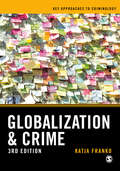- Table View
- List View
Globalisation, Global Justice and Social Work
by Michael Lavalette Iain Ferguson Elizabeth WhitmoreGlobalization has become a seemingly unstoppable force over recent decades and, in its wake, global notions of social justice have developed in response to its negative aspects. Neo-liberal economic policies have been a key element in the wider process of globalization, and these policies have had a profound impact on welfare provision and the shape of social work practice. Arising dissatisfaction among users of welfare and social work services is fuelling the search for a new, more radical social work that is firmly rooted in principles of social justice. Globalisation, Global Justice and Social Work explores the global effects of neo-liberal policies on welfare services in different countries, with contributions from social work academics, practitioners and welfare activists around the world. The first section of the book presents case studies of impact of neo-liberalism on welfare systems, social service provision and the practice of social work. In the second section the chapters explore the relationship between social work practice and the struggle for social justice. Authors discuss the personal and political dilemmas they have had to address in seeking to link a personal commitment to social justice with their daily practice as workers and educators in social work. The final section assesses the prospects for social work practice based on notions of social justice, by looking at what can be learned from the experience of previous radical movements as well as from emergent global and local movements.
Globalisation, Human Rights and Education (Globalisation, Comparative Education and Policy Research #51)
by Joseph Zajda Yvonne VissingThis book analyses major discourses of human rights and education. It examines critically major issues confronting human rights and education, both locally and globally. The various chapters analyze the challenges that different societies are faced with, as they attempt to implement, protect and defend democracy, cultural diversity and human rights in schools. The book helps readers to explore their own views and consider more broadly what may be in the best interests of a fair and just society, as envisioned in human rights treaties, human rights education in schools, and cultural diversity.
Globalisation, Localisation and Sustainable Livelihoods
by Geoffrey Lawrence Reidar AlmasThis title was first published in 2002. One of the greatest concerns facing the world is how to ensure that sustainable outcomes are generated as globalization proceeds apace. Quite simply, many people are finding their life chances deteriorating - with resistance to globalization being a common response. The question is: is it possible to guarantee sustainable livelihoods for individuals, families and communities as global processes increasingly shape local social relations? This volume is a collection of 16 chapters from leading rural sociologists and human geographers based in Europe, Australasia, and the Americas. The book, in three parts, deals with globalization and food; the restructuring of local agriculture; and communities and resistance in a globalizing world. The introduction to the book compares and contrasts the various experiences of communities in countries such as Australia, Brazil, Finland, Norway, South Africa and the United States as they "struggle" to cope with globalization and its effects. Each chapter discusses options to ameliorate the local consequences of global change.
Globalisation, Migration and Socio-Economic Change in Contemporary Greece: Processes of Social Incorporation of Balkan Immigrants in Thessaloniki (IMISCOE Dissertations)
by Panos HatziprokopiouThis empirical study examines issues surrounding the integration of immigrants in Greece, in particular in Thessaloniki, as well as looking at migrants in neighbouring countries, Albania and Bulgaria. The book suggests that immigrants’ integration should be understood in relation to broader processes of social change, which are increasingly connected to global forces. The transformation of Greece into a multicultural society has taken place during a period of transition and of increasing exposure to the international environment. Within this context, Thessaloniki has become a new home for immigrants from the Balkans in search of new identities Integration is seen as a multifaceted and dynamic process. The concept of incorporation is critically introduced, in order to analyse both the ways by which migrants organise their lives in the host society and their structural, institutional and cultural conditions. The analytical framework is built upon an interdisciplinary approach that takes into account different incorporation contexts: socio-political responses, the labour market, housing and social space. A number of additional factors are also considered, e.g. the composition of migrant populations, migratory patterns and dynamics, the role of social networks, immigrants’ strategies.The book provides an empirical account of the immigrants’ characteristics, explaining the patterns and typologies of immigrants’ integration in Greece. “Immigrants” become a social category “constructed” by exclusionary mechanisms: restrictive immigration policy, labour market exploitation, xenophobia. However, they do make a living in Thessaloniki; their integration is subject to time. gradually, immigrants become organic elements of the host society, which shapes, but is also being shaped by migration.
Globalisation, Nation-Building and History Education (Globalisation, Comparative Education and Policy Research #40)
by Joseph Zajda John WhitehouseThis book uses historiography and discourse analysis to provide a new insight into understanding the nexus between ideologies, the state, and nation-building—as depicted in history school textbooks. It focuses on the interpretation of social and political change, significant events, and examining possible new biases and omissions in school textbooks. The ‘Europeanization’ of history textbooks in the EU is an example of western-dominated Grand Narrative of pluralist democracy, multiculturalism, and human rights, according to the canon of a particularly European dimension. Various public debates in the USA, China, the Russian Federation (RF), Japan, and elsewhere, dealing with understandings of a nation-building, national identity, and history education point out to parallels between the political significance of school history and the history education debates globally.The book demonstrates that the issue of national identity and balanced representations of the past continue to dominate the debate surrounding the goals, dominant ideologies and content of history textbooks, and historical narratives. It concludes that competing discourses and ideologies will continue to define and shape the nature and significance of historical knowledge, ideologies and the direction of values education in history textbooks. This book provides an easily accessible, practical, yet scholarly insights into local and global trends in the field of history education, and should be required reading for a broad spectrum of users, including policy-makers, academics, graduate students, education policy researchers, administrators, and practitioners.
Globalisation, Tourism and Simulacra: A Baudrillardian Study of Tourist Space in Thailand (Routledge Advances in Sociology)
by Kunphatu SakwitThis book draws on the thought of Baudrillard to explore the effects of globalisation and tourism in a Thai context. Arguing that tourism does not necessarily erode local culture but that local culture can in fact be recreated through globalisation and tourism, the author employs studies of the Damnoen Saduk and Pattaya floating markets, showing them to be simulations of Thai culture that undergo changes of form, cultural content and activity, through various stages of representation. With a focus on the themes of the circulation of value and signs, the play of differences and orders of simulacra, this volume examines the extent to which Baudrillard’s theory can apply in a non-western context and in relation to tourism. A study of consumption, tourism and the relations between the global and the local, Globalisation, Tourism and Simulacra will appeal to scholars of sociology and geography with interests tourism, globalisation and social theory.
Globalisation, Transition and Development in China: The Case of the Coal Industry (Routledge Studies on the Chinese Economy #Vol. 11)
by Rui HuaichuanBased on extensive original research, Globalisation, Transition and Development in China explains China's development strategy and its underlying forces, and the success of this strategy. It examines China's gradualist approach which emphasizes development first and regards transition and globalization as secondary, enacting liberalization of domestic markets and integration into the world economy in a paced way, avoiding dramatic changes which might impede or even reverse development, and argues that this approach is broadly correct. It considers China's failures, including the failure to build large globally competitive corporations despite the intention to do this, and shows how China's economic strategy has been implemented in detail with a case study of the large and important coal industry.
Globalised Resistance and the Bring Back Our Girls Movement: New Dimensions of Transnational Activism (Routledge Studies in Peace, Conflict and Security in Africa)
by Titilope F. AjayiThis book uncovers how women’s movements in the Global South are changing the face of transnational activism in their mobilisations against militarism and conflict-related gender violence.Drawing on the case study of the Bring Back Our Girls (BBOG) movement established by Nigerian women for the rescue of Nigerian schoolgirls abducted in 2014 by violent extremist group Boko Haram, the book argues that BBOG is one of several emerging forms of transnational resistance in Africa that are breaking old moulds and forging new directions for social movements globally. The book argues that current research on social movements focuses too much on professional advocacy by formal civil society organisations and networks in the Global North. In doing so, it misses the increasingly spontaneous, mass-based protests initiated and led by Global South actors grounded in Global South contexts. Unpacking the workings of the BBOG movement, both internationally and regarding on-the-ground daily struggles in Nigeria, the book highlights their considerable implications for the practice and study of international politics.This book is an important read for researchers of international relations, decolonisation, social movements, and transnational human rights activism. Activists and leaders of social movements will also find the policy implications highlighted by the book useful.
Globalising Everyday Consumption in India: History and Ethnography (Routledge Contemporary South Asia Series)
by Bhaswati BhattacharyaThis book brings together historical and ethnographic perspectives on Indian consumer identities. Through an in-depth analysis of local, regional, and national histories of marketing, regulatory bodies, public and domestic practices, this interdisciplinary volume charts the emergence of Indian consumer society and discusses commodity consumption as a main feature of Indian modernity. The nationalist discourse was formed by starting with the morality of consumption patterns feeding into middle-class identity; the chapters demonstrate how different strata of society were targeted as markets for everyday commodities associated with global lifestyles early on. A section of the book illustrates how a new group of professionals engaged in advertising trying to create a market shaped tastes and discourses and how campaigns provided a range of consumers with guidance on ‘modern lifestyles’. Chapters discussing advertisements for consumables, like coffee and cooking oil, show these to be part of new public cultures. The ethnographic chapters focus on contemporary practices and consumption as a main marker of class, caste and community. Throughout the book consumption is shown to determine communal identities, but some chapters also highlight how it reshapes intimate relationships. The chapters explore the middle-class family, microcredit schemes, and metropolitan youth cultures as sites in which consumer citizenship is realised. The book will be of interest to readers from a range of disciplines, including anthropology, history, geography, sociology, South Asian studies, and visual cultures.
Globalising Food: Agrarian Questions and Global Restructuring
by David Goodman Michael WattsIn an increasingly global world, societies are being provisioned from a bewildering array of sources as new countries and new food commodities are drawn into international markets. Globalising Food provides an innovative contribution to the area of political economy of agriculture, food and consumption through a revealing investigation of the globalisation and restructuring of localised agricultural sectors and food systems.The book draws on new theoretical perspectives and wide-ranging case studies from Britain, the USA, India, South Africa, New Zealand and Latin America. The key themes addresses range from giant multinational food corporations, rural industrialisation and World Bank policies, to the regulation of pollution, labour relations, urban food politics and environmental sustainability. Globalising Food offers important insights into the problems, consequences and limits of the industrialisation of agriculture and the provisioning of food in a global world as we approach the new millenium.
Globalising Hatred: The New Antisemitism
by Denis MacShaneA hard-hitting essay combined with factual reportage on the new anti-semitism throughout Europe.This book argues that what the 21st century now faces is an ideological assault based on hatred of Jews which is as serious as any major threat to universal values as the world has faced. Anti-semitism is the visible language and action of a deeper threat to world peace, to the achievements of the human spirit we call the Enlightenment, and undermines vital work to address problems like poverty and the challenges of the environment.Denis MacShane's survey of 21st century anti-semitism is based on the All-Party Commission of Enquiry which was chaired by the author in the UK. His book considers examples in Europe and how anti-semitism is now a linking mechanism between different extremisms, usually but not exclusively of the Right. It lists in detail the anti-semitism in national party politics, including the European Parliament, and it examines how Holocaust denial is not a question of liberal free-expression issues but an organised ideological position. The new anti-semitism arises from three main sources: state-sanctioned anti-semitism; that of terrorist movements like Al Qaeda; and that of political movements like the Muslim Brotherhood and its off-shoots and spokesmen.The book is both a cri de coeur for a new tolerance and a resolution to throw light on 21st century anti-semitism, which has left Europe to become a new form of mobilising politics across many continents.
Globalising Hatred: The New Antisemitism
by Denis MacShaneA hard-hitting essay combined with factual reportage on the new anti-semitism throughout Europe.This book argues that what the 21st century now faces is an ideological assault based on hatred of Jews which is as serious as any major threat to universal values as the world has faced. Anti-semitism is the visible language and action of a deeper threat to world peace, to the achievements of the human spirit we call the Enlightenment, and undermines vital work to address problems like poverty and the challenges of the environment.Denis MacShane's survey of 21st century anti-semitism is based on the All-Party Commission of Enquiry which was chaired by the author in the UK. His book considers examples in Europe and how anti-semitism is now a linking mechanism between different extremisms, usually but not exclusively of the Right. It lists in detail the anti-semitism in national party politics, including the European Parliament, and it examines how Holocaust denial is not a question of liberal free-expression issues but an organised ideological position. The new anti-semitism arises from three main sources: state-sanctioned anti-semitism; that of terrorist movements like Al Qaeda; and that of political movements like the Muslim Brotherhood and its off-shoots and spokesmen.The book is both a cri de coeur for a new tolerance and a resolution to throw light on 21st century anti-semitism, which has left Europe to become a new form of mobilising politics across many continents.
Globalising Housework: Domestic Labour in Middle-class London Homes,1850-1914 (Home)
by Laura HumphreysThis book shows how international influences profoundly shaped the ‘English’ home of Victorian and Edwardian London; homes which, in turn, influenced Britain’s (and Britons’) place on the world stage. The period between 1850 and 1914 was one of fundamental global change, when London homes were subject to new expanding influences that shaped how residents cleaned, ate, and cared for family. It was also the golden age of domesticity, when the making and maintaining of home expressed people’s experience of society, class, race, and politics. Focusing on the everyday toil of housework, the chapters in this volume show the ‘English’ home as profoundly global conglomeration of people, technology, and things. It examines a broad spectrum of sources, from patents to ice cream makers, and explores domestic histories through original readings and critiques of printed sources, material culture, and visual ephemera.
Globalism and Localization: Emergent Solutions to Ecological and Social Crises
by Jeanine M. CantyConsidering the context of the present ecological and social crisis, this book takes an interdisciplinary approach to explore the relationship between globalism and localization. Globalism may be viewed as a positive emergent property of globalization. The latter depicts a worldwide economic and political system, and arguably a worldview, that has directly increased planetary levels of injustice, poverty, militarism, violence, and ecological destruction. In contrast, globalism represents interconnected systems of exchange and resourcefulness through increased communications across innumerable global diversities. In an economic, cultural, and political framework, localization centers on small-scale communities placed within the immediate bioregion, providing intimacy between the means of production and consumption, as well as long-term security and resilience. There is an increasing movement towards localization in order to counteract the destruction wreaked by globalization, yet our world is deeply and integrally immersed within a globalized reality. Within this collection, contributors expound upon the connection between local and global phenomenon within their respective fields including social ecology, climate justice, ecopsychology, big history, peace ecology, social justice, community resilience, indigenous rights, permaculture, food justice, liberatory politics, and both transformative and transpersonal studies.
Globalismo: Ingeniería social y control total en el siglo XXI
by Agustin LajeDesvela los mecanismos ocultos de la dominación mundial con Globalismo: Ingeniería social y control total en el siglo XXI. El exitoso autor Agustín Laje desentraña magistralmente la malvada realidad de nuestro mundo moderno e ilumina las tinieblas de las fuerzas de poder que tratan de controlar a la humanidad. El globalismo no es globalización, sino una demoledora ideología que supone el más ambicioso proyecto de ingeniería social y control total en curso. Institucionalizada en organizaciones que, por definición, no tienen ni patria, ni territorio ni pueblo, esta ideología pretende parir un régimen político antidemocrático de alcance global. Así la soberanía de las naciones se redistribuye entre organizaciones supranacionales como el Foro Económico Mundial o la ONU con su Agenda 2030, liberadas de las limitaciones de los intereses particulares de los pueblos, para coordinar las transformaciones necesarias para nuestra «supervivencia». El globalismo también propone nuevas formas de legitimidad basadas en la tecnocracia y la supuesta filantropía de organizaciones como la Fundación Gates, la Open Society de Soros, y la Fundación Rockefeller.En esta obra, Agustín Laje explica magistralmente el origen y la formación del contrato social de nuestros Estados nacionales sobre una base democrática, mostrando cómo el globalismo busca culpabilizar estas estructuras para llevarnos a un callejón sin salida, donde todo se cede a una gobernanza global no representativa, la máxima expresión de la oligarquía de unos pocos privilegiados a los que nadie votó, y que ante nadie rinden cuentas pero que pretenden dirigir el destino del planeta.El autor llama a todos los actores sociales, políticos, religiosos e intelectuales a unirse contra el globalismo. La paradoja de que los patriotas olviden sus fronteras para esta batalla cultural adquiere un nuevo significado. Conocer la verdad y denunciar la mentira es un arma valiosa que este libro ofrece.GlobalismUncover the secret workings of world domination with Globalism: Social Engineering and Total Control in the 21st Century. Best-selling author Agustín Laje masterfully unravels the sinister reality of our modern world and sheds light on the darkness of the forces of power that seek to control humanity.Globalism is not globalization, but rather a devastating ideology representing the most ambitious social engineering and total-control project currently underway.Institutionalized by organizations such as the World Economic Forum or the UN with its Agenda 2030, Globalism also promotes new forms of legitimacy based on &“technocracy&” and the supposed philanthropy of organizations such as the Gates Foundation, Soros&’ Open Society, and the Rockefeller Foundation.In this book, Agustín Laje skillfully explains the origin and formation of the social contract of our nation-States based on democracy, demonstrating how globalism seeks to blame these structures in order to steer us into a dead-end, where everything is handed over to a non-representative global governance. This represents the ultimate expression of an oligarchy formed by a few privileged elites who were elected by no one and are accountable to nobody, yet aim to dictate the destiny of the planet.The author calls on all social, political, religious, and intellectual figures to unite against globalism. The paradox of patriots disregarding their borders for this cultural battle takes on a new significance. Knowing the truth and denouncing the lie is a valuable weapon that this book offers.
Globalization (Key Ideas)
by Malcolm WatersThe constraints of geography are shrinking and the world is becoming a single place. Globalization and the global society are increasingly occupying the centre of sociological debates. Widely discussed by journalists and a key goal for many businesses, globalization has become a buzz-word in recent years. In this extensively revised and restructured new edition of Globalization , Malcolm Waters provides a user-friendly introduction to the main arguments about the process, including a chapter on the critiques of the globalization thesis that have emerged since the first edition was published.
Globalization From Below: Transnational Activists And Protest Networks (Social Movements, Protest And Contention Series #82)
by Donatella Della Porta Herbert Reiter Lorenzo Mosca Massimillano AndrettaThis volume is the result of a long-lasting collaboration that has already produced two other books on the "new global" movements, in particular on the anti-G8 demonstrations in Genoa in 2001: Global, Noglobal, New Global m Italian (Andretta et al. 2002) and Global No Global in German (Andretta et al. 2003). We are grateful to those who helped us produce those two books. Although some of the ideas developed in those previous works are reported in this volume, here we analyze a new set of data on the first European Social Forum in 2002.
Globalization In Southeast Asia
by Shinji Yamashita J. S. EadesThe rapid postwar economic growth in the Southeast Asia region has led to a transformation of many of the societies there, together with the development of new types of anthropological research in the region. Local societies with originally quite different cultures have been incorporated into multi-ethnic states with their own projects of nation-building based on the creation of "national cultures" using these indigenous elements. At the same time, the expansion of international capitalism has led to increasing flows of money, people, languages and cultures across national boundaries, resulting in new hybrid social structures and cultural forms. This book examines the nature of these processes in contemporary Southeast Asia with detailed case studies drawn from countries across the region, including Indonesia, Malaysia, the Philippines, Singapore and Thailand. At the macro-level these include studies of nation-building and the incorporation of minorities. At the micro-level they range from studies of popular cultural forms, such as music and textiles to the impact of new sects and the world religions on local religious practice. Moving between the global and the local are the various streams of migrants within the region, including labor migrants responding to the changing distribution of economic opportunities and ethnic minorities moving in response to natural disaster.
Globalization and American Popular Culture (Globalization)
by Lane CrothersNow in a fully revised and updated edition, this concise and insightful book explores the ways American popular products such as movies, music, television programs, fast food, sports, and even clothing styles have molded and continue to influence modern globalization. Lane Crothers offers a nuanced examination of both the appeal of American products worldwide and the fear and rejection they induce in many people and nations around the world. The author defines what we mean by "popular culture," how popular culture is distinguished from the generic concept of "culture," and what constitutes "American" popular culture. Tracing how U.S. movies, music, and TV became dominant in world popular culture, Crothers also considers the ways in which non-visual products like fast-food franchises, sports, and fashion have become ubiquitous. Concluding with a projection of the future impact of American popular culture, this book makes a powerful argument for its central role in shaping global politics and economic development.
Globalization and American Popular Culture (Globalization)
by Lane CrothersNow in a fully revised and updated edition, this concise and insightful book explores the ways American popular products such as movies, music, television programs, fast food, sports, and even clothing styles have molded and continue to influence modern globalization. Lane Crothers offers a thoughtful examination of both the appeal of American products worldwide and the fear and rejection they induce in many people and nations around the world. The author defines what we mean by "popular culture," how popular culture is distinguished from the generic concept of "culture," and what constitutes "American" popular culture. Tracing how U.S. movies, music, and TV became dominant in world popular culture, Crothers also considers the ways in which non-visual products like fast-food franchises, sports, and fashion have become ubiquitous. He also presents a fascinating set of case studies that highlight the varied roles American products play in a range of different nations and communities. Concluding with a projection of the future impact of American popular culture, this book makes a powerful argument for its central role in shaping global politics and economic development.
Globalization and Antiglobalization: Dynamics of Change in the New World Order (The\international Political Economy Of New Regionalisms Ser.)
by Jonathan RutherfordThis title was first published in 2003. Globalisation can be seen to provide the context for epoch-defining changes in social and economic forms of organisation. However, it has also changed the context for and the organisational forms of politics, unleashing forces in support of, and in opposition to, the globalisation dynamic. This text examines the dynamics of change and development in two regions of the world economy, Latin America and Asia, and is a series of explorations into the forces, their political dynamics, and the responses of governments and citizens. The focus of the explorations, and regional case studies, is on the role of the nation-state, international organisations and social movements.
Globalization and Civil Society in East Asian Space (Politics in Asia)
by Khatharya Um Chiharu TakenakaThis book critically examines the impact of globalization, changing power dynamics, migration, and evolving rights regimes on regional order, discourse of national governance, state and society relations, and the development of civil society in East Asia.Providing a textured, critical reading of East Asia as an economically, socially, and politically dynamic region, this book also presents the region as one shaped simultaneously by progressive as well as regressive pulls. Attentive to prevailing issues as well as to states’ and civil societies’ responses to them, it focuses on changing societies and politics in East Asia, particularly on shifting notions of citizenship, nationhood, and peoplehood. The contributions feature new and timely conclusions drawn from multidisciplinary fields including law, public policy, sociology, Asian studies, gender, sexuality, and ethnic studies and include direct testimonies from citizens of East and Southeast Asia.Globalization and Civil Society in East Asian Space will appeal to students and scholars of sociology, political science, and Asian studies more broadly.
Globalization and Competition
by Luiz Carlos Bresser PereiraGlobalization and Competition explains why some middle-income countries, principally those in Asia, grow fast while others are not successful. The author criticizes both old-style developmentalism and the economics of the Washington Consensus. He argues instead for a "new developmentalism" or third approach that builds on a national development strategy. This approach differs from the neoliberal strategy that rich nations propose to emerging economies principally on macroeconomic grounds. Developing countries face a key obstacle to growth, namely, the tendency to overvaluate foreign exchange. Instead of neutralizing it, the policy that rich countries promote mistakenly seeks growth through foreign savings, which causes additional appreciation of the national currency and often results in financial crises rather than genuine investment.
Globalization and Corporate Citizenship: A Collection of Seminal Essays
by Malcolm McIntoshThe theory and practice of corporate citizenship and CSR have many alternative perspectives to the business-as-usual gaze. The essays in this volume encapsulate the essence of these alternative ideas and embrace the idea that progressive ways and means of this century do not lie in mainstream capitalist thinking. These pieces ask critical questions about the way we see the relationship between capitalism, business models and society – a subject not often discussed in non-academic literature. Globalization and Corporate Citizenship: The Alternative Gaze features contributions and new analysis from Klaus M. Leisinger, Chris Laszlo, David Coopperrider, Simon Zadek, Sandra Waddock and others. This title is one of a two-volume set – a collection of seminal and thought-provoking essays, drawn from the Journal of Corporate Citizenship’s archive, accompanied by new analysis and reflection from the original authors. Written by some of the most widely recognized academic and business pioneers and leaders of the corporate responsibility and global sustainability movement, the volumes make essential reference texts for anyone interested in the radically awakening new global political economy.
Globalization and Crime (Key Approaches to Criminology)
by Katja FrankoNow in its third edition, Globalization & Crime provides students with a comprehensive overview of the essential themes and conceptual debates surrounding globalization and global criminology. It examines established topics such as human trafficking and smuggling, migration and organised crime. But also explores modern issues such as the refugee crisis in Europe, cyber-hacking and enforcement, and the failure of Internet Service Providers to take responsibility for online content. The third edition has been significantly updated with new content and examples, along with modern case studies, such as the political context surrounding the development of ISIS, organ trafficking, and an anti-globalization backlash in the UK and US. It also features two new chapters: &‘Global Ecological Destruction&’ – An investigation into the development of environmental criminology, and &‘Towards a Cosmopolitan Criminology?&’ – An overview of the possibilities for establishing a global criminology and coverage of the emerging issues to consider for the future. Ideal reading for undergraduate and postgraduate students of criminology, globalization and sociology.
